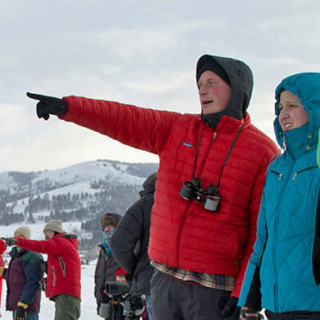Student Spotlight: John Stefanek
In this episode, hear from John Stefanek, a Ph.D. student in UM’s History program. Stefanek discusses his current research, which revolves around Butte’s Model Cities Program, and his motivation to become a teacher.
Episode Extras
Story Transcript
My name is John Stefanek. I'm a second-year doctoral student here in the history program. My main interests are in 20th century U.S. history, political history, environmental history along with animal history, and also Latin American history.
The project I'm working on right now is on the Butte model cities program. Model cities was one of Lyndon Johnson's great society programs in the sixties. That was a massive ambitious urban renewal project. So, looking at American cities, trying to restore them, beautifying them with parks and recreation and also of course, addressing racial inequality issues with housing issues, for example. And so, Butte lacked a lot of infrastructure in the first place. It was built to be a re–, resource extraction kind of city, where it was all based around mining and resources, but not actually sustain living. And so, you had issues of like not having access to proper health care, dental care, senior citizens, you know, they're, they're very much, you know, lacking in support for them. And so, the model cities program was this massive endeavor to try to fix all of that, to try to, to try to bring actual infrastructure and life to Butte. But, on the other side of that, it was controversial as much as many people liked it. There was also a lot of opposition to it in the sense of destroying their history in Butte. And there actually was an archivist here at the university that wrote in the 60s and 70s about, their concerns about these, these buildings being destroyed, the artifacts, and them being destroyed. So, at the time, I think it was an attempt to almost destroy some of Butte's history, but rebuild it to create this new history, to create this new Butte that was really on top of caring for its citizens, making sure everyone got proper access to, you know, basic necessities.
I'm from Alma, Michigan. It's a small city in the middle of lower peninsula, Michigan. And I went to Alma college there, studying history and political science, and I just fell in love with the fields there.
It wasn't probably until my, I think, junior year of college where I decided I want to go further with my education. I think what really, to me, sold that -- going on to graduate studies -- was my advisor himself. Not in just encouraging me, but he had been such a great role model for me. Not only was he one of the smartest guys I've ever met, but he was so compassionate with his students wanting them to succeed not only just, you know, as a mentor, but, you know, just as a person. He always really cared about his students and that's something that really encouraged me. Like, I want to do this too. I want to also be someone who is, of course, has a lot of knowledge, but more importantly can be a good model to help students also take their education and improve themselves. So, that to me, was the selling point of graduate school was being able to watch students grow and help them grow like my advisor helped me grow.
I'm really thankful for the faculty here. The most influential faculty for me so far have been Kyle Volk and Michael Mayer. Kyle Volk was the first professor I had any contact with out here. When I was applying to graduate schools, I reached out to some of the faculty that I thought had similar interests to mine. He has a lot of great research on political history, social history, things that I had interests in. And he’s been really informative in the sense of how to actually, you know, succeed in grad school. How to read a book in a week. How do you pull the necessities from a book and talk about it, you know, in class. I think that's so important to have advisors here who just want you to succeed and will be there for you a hundred percent, all the way. That's so important to have a good relationship with your advisor, you have to have that I think to really press on and be able to succeed.
I think my biggest impact I can make in the world of history is being a really down to earth, compassionate person that can really show my love for history to other people. I think more than anything, I just want to be a positive role model and just citizen with history. It’s a simple way of putting it, but I think more than anything that's at the core of who I am.
